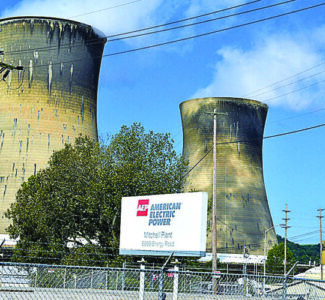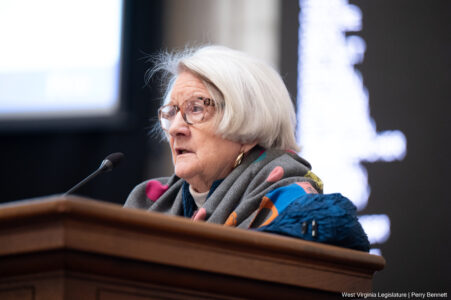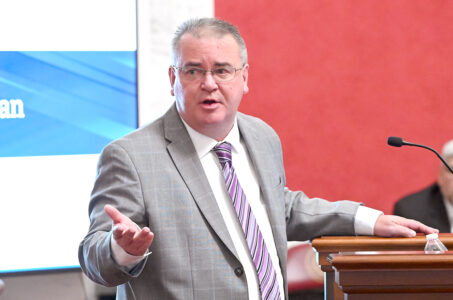No Electric Rate Increase for Now, West Virginia Public Service Commission Says

American Electric Power’s Mitchell plant is seen along W.Va. 2 near Moundsville. (File Photo)
CHARLESTON — Headlines about electric rate increases sometimes bring criticism, but an order issued Thursday by the West Virginia Public Service Commission includes good news for customers.
According to the order, the PSC denied most of a $250.5 million electric rate increase being sought by Appalachian Power and Wheeling Power, subsidiaries of Columbus-based American Electric Power.
Instead, the PSC did grant a revenue requirement increase of $76.1 million while also requiring that current electric rates remain unchanged for customers while the company works toward a refinancing plan.
“We’re pleased that the PSC saw the advantages for our customers in our securitization plan,” Aaron Walker, Appalachian Power president and chief operating officer, said in a Friday press release.
“However, we are disappointed that the PSC didn’t recognize the full investment made on the system on behalf of our customers.”
Although the order recognizes the need for a base rate increase of $76.1 million, customer rates will stay the same for now. The PSC will soon make a final decision on securitization, a proposal that aims to ease the impact of the base rate increase by spreading out the cost recovery over a longer period, the release said.
The order provides additional support for customer assistance programs and extends the eligibility window for certain assistance programs. Additionally, it adopts proposed net metering changes to ensure fairness for customers who install their own generation equipment.
At the PSC’s direction, APCo will conduct a study to determine the feasibility of a summer rate plan for residential customers, according to Appalachian Power’s release.
Last November, Appalachian Power and Wheeling Power filed revised tariff sheets with the PSC, seeking $250.5 million annually, or a 14.6% increase, impacting over 460,000 customers across their service area. The companies requested an increase beginning Dec. 1, 2024, but the PSC suspended the proposed rates until Aug. 28. The PSC held two days of evidentiary hearings in this case earlier this summer.
In March, the companies filed an application with the PSC to securitize certain assets in order to reduce the effect of the rate increase request. The West Virginia Legislature passed a bill in 2023 allowing for securitization, with Virginia passing a similar bill in March.
Securitization allows for the conversion of certain utility costs — such as generating assets, storm costs, fuels, capital expenditures, etc. — into bonds, which typically have lower interest rates, theoretically benefiting customer affordability. According to the order, the PSC will be making a decision on the companies’ securitization plan soon.
“The Commission should approve securitization in a separate Order to result in the capitalization of a large portion of the investment approved in this base rate case and a large portion of deferred costs currently capitalized by the Companies’ current capital sources at lower capital costs, thereby reducing rates,” the PSC wrote. “The Companies should continue to bill customers at the current rates with no increase on customer bills resulting from this decision.”
Among other things in the 78-page order, the PSC recommended that the companies continue to participate in the Dollar Energy Fund, which provides assistance to eligible West Virginians with paying their gas, electric and water bills. While the companies have provided $250,000 in the past, the PSC ordered the companies to provide $1 million. The PSC also increased the limits on how much an eligible customer can receive and decreased reconnection charges.
“Thousands of West Virginians spoke out against unaffordable rate hikes and difficulty managing the ever-growing cost of energy, and the PSC’s decision reflects the power of public input to ease the burden on families,” said Dani Parent, executive director of West Virginia Citizen Action Group. “Expanding the Dollar Energy Fund will provide significant relief for the West Virginians who need it most.”
“It goes to show you how engaged people are around these issues,” said Courtney MacDonald, a representative of West Virginians for Energy Freedom. “More than 5,000 West Virginians took the time to speak out because they know what’s at stake. We think that’s more than any other case in PSC history.”
The PSC addressed issues with solar net metering, allowing participants to stay grandfathered into the 1:1 credit program a year longer than the companies had wanted and setting the credit at 12.4 cents per kilowatt hour, or about two-thirds to three-fourths of the retail rate.
“Although we are losing the 1:1 retail credit, the PSC’s decision on the new bill credit rate preserves the right of West Virginians’ to participate fairly in our energy system,” said Leah Turgeon, state director for Solar United Neighbors. “Under this order, solar owners and those who wish to take control of where their energy comes from will continue to benefit from distributed solar power into the future– a win for West Virginia’s solar industry and residents alike.”
“Residents and businesses are tired of seeing their bills go up and paying for unreliable service. Keeping the lights on shouldn’t be a universal struggle,” MacDonald said. “Thank you to the Commission for protecting low-income ratepayers through the Dollar Energy Fund and safeguarding net metering.”
The PSC also reduced the prices the companies were charging local governments making the switch to energy-efficient LED streetlights.
“Local governments will finally be able to save money when they have more efficient LED streetlights,” said Emmett Pepper, policy director for Energy Efficient West Virginia. “It never made sense that it cost municipalities more money in order to save energy for the utility, so kudos to the PSC for fixing that issue.”






